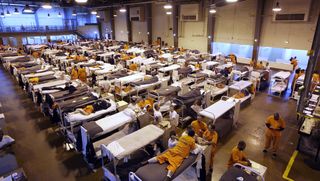
Allison Schrager in Quartz (AP Photo/Eric Risberg, File):
A new paper from University of Michigan economics professor Michael Mueller-Smith measures how much incapacitation reduced crime. He looked at court records from Harris County, Texas from 1980 to 2009.Mueller-Smith observed that in Harris County people charged with similar crimes received totally different sentences depending on the judge to whom they were randomly assigned. Mueller-Smith then tracked what happened to these prisoners. He estimated that each year in prison increases the odds that a prisoner would reoffend by 5.6% a quarter. Even people who went to prison for lesser crimes wound up committing more serious offenses subsequently, the more time they spent in prison. His conclusion: Any benefit from taking criminals out of the general population is more than off-set by the increase in crime from turning small offenders into career criminals.
High recidivism rates are not unique to Texas: Within 5 years of release more than 75% of prisoners are arrested again.
Why does prison turn people into career criminals?
Prison obliterates your earnings potential. Being a convicted felon disqualifies you from certain jobs, housing, or voting. Mueller-Smith estimates that each year in prison reduces the odds of post-release employment by 24% and increases the odds you’ll live on public assistance. Time in prison also lowers the odds you’ll get or stay married. Being in prison and out of the labor force degrades legitimate skills and exposes you to criminal skills and a criminal network. This makes crime a more attractive alternative upon release, even if you run a high risk of returning to prison.
You could argue prison is still worth it if long sentences discouraged people from committing crime in the first place. Mueller-Smith estimates a one-year prison sentence would only be worth it (in terms of prison cost and forgone economic potential) if it deterred at least 0.4 fewer rapes, 2.2 assaults, 2.5 robberies, 62 larcenies or prevented 4.8 people from becoming a habitual drug user. And the deterrent effect is not this powerful—not even close. There exists little evidence that the possibility of a long prison sentence is much of a crime deterrent at all.
